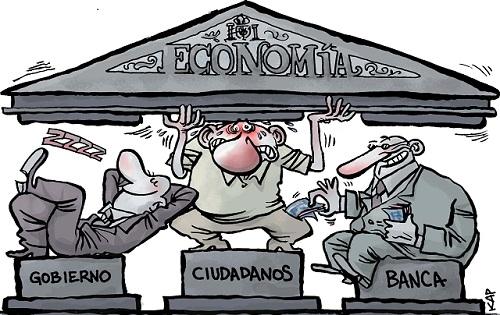A left-wing of the public sphere
The central project of capitalism is the generalized mercantilisation of every sphere of society, transforming everything into merchandise. The public sphere promotes all individuals as citizens, as subjects of rights.
- Opinión

The left-wing in the 20th century was a Statist left that used the State to organize projects as a nation, to make it promote economic development and guarantee social rights. It had a fundamental role, above all if we recall that previously the State was strictly confined to the dominant elites, the primary exporting oligarchies, who transformed it into an instrument of their interests.
When the long expansive cycle of international capitalism ran dry, and with it the developmental model, two perspectives appeared on the horizon. Ronald Reagan spearheaded the winning one: the State had ceased to be the solution, it was the problem. And the way to face this problem was to reduce it to its minimum proportion, the minimal State, and push the market into the central role. The old liberal adage gained new force: the market is the best distributor of resources.
Apparently opposed to this version, there arose a narrative that also claimed to surpass the worn out State, but proposing "civil society" as its substitute. This vision also condemned the State, maybe even more so than the other one. Toni Negri even portrayed it as conservative, as a museum piece. Holloway had hopes that the world could be changed without taking power, without the State.
The first group have realized their dream and have brought the world to its present disasters, the result of the centrality of an uncontrolled market, a market dominated by speculative capital and the big private banks. The second group have become irrelevant, prisoners of the liberal trap, of a civil society against the State.
The alternative version was different. It was not the abandonment of the State but its democratization. It was neither the abandonment of the mercantile sphere, nor a simple return to the State sphere, but rather the construction, led by the State and social organizations, of the public sphere. A sphere of citizens, of equal rights for all, the truly democratic sphere.
The governments that have reversed the neoliberal model based on the centrality of the market are those that have taken advantage of the State to promote the social rights of all, to rescue the active role of the State as a generator of economic growth and promoter of sovereign foreign policy. This was the case of the anti-neoliberal governments of South America.
But even they have retrieved the State without changing it; they have defended society from the negative consequences of an uncontrolled market, but without democratizing the State through the centrality of the public sphere. The State apparatus has resisted from within, allied with external conservative forces, seeking to hold back the widespread process of political, social, economic and cultural democratization that is lacking in contemporary societies.
When anti-neoliberal governments face obstacles, they should not simply yield to traditional liberalism, to the market; to the contrary, they should advance towards the radical transformation of the State with centrality of the public sphere. The fundamental contradiction of the neoliberal era is between the mercantile sphere -- the drive to commodify everything, to transform rights into merchandise and citizens into consumers -- and the public sphere, the sphere of rights for all, the sphere of citizens.
We can measure how far we have advanced in overcoming neoliberalism by the degree to which we have moved towards extending rights to everyone and to restricting the mercantilization of society. The degree to which we have strengthened public education, public health care, instead of mercantile education, mercantile health care; strengthening public banks rather than private banks.
The public sphere does not represent only the democratization of present society, but points toward an anticapitalist dynamic, to the extent that the axis and central project of capitalism is the generalized mercantilisation of every sphere of society, transforming everything into merchandise, where everything has a price, everything can be bought and sold. The public sphere, to the contrary, promotes the rights of everyone, the promotion of all individuals as citizens, that is, as subjects of rights.
In order to create a left-wing of the public sphere, it is indispensable to make a radical critique of all the negative effects of the centrality of the market, but above all, to develop a profound and radically democratic public consciousness, a spirit of the centrality of public goods, of public enterprises, of public services, of the State as an instrument in the hands of society as a whole and above all of workers and of the people. Thus the State is neither the solution in itself, nor is it the problem. It is a space of dispute between the mercantile and the public spheres. The left-wing of the 21st century must be a left of the public sphere – which is today's way of being anticapitalist – for the construction of deeply democratic societies and of a world that belongs to its peoples, through these democratized national States, centred on the public sphere.
17/03/2017
(Translated for ALAI by Jordan Bishop)
- Emir Sader, Brazilian sociologist y political scientist, is coordinator of the Laboratory of Public Policy of the Universidad Estadual de Rio de Janeiro (UERJ).
Del mismo autor
- Hay que derrotar políticamente a los militares brasileños 07/04/2022
- China y Trump se fortalecen 04/03/2022
- Pandemia e Ucrânia aceleram decadência da hegemonia norte-americana no mundo 28/02/2022
- Pandemia y Ucrania aceleran la decadencia de la hegemonía norteamericana en el mundo 28/02/2022
- La anti-política generó la fuerza de extrema derecha 22/02/2022
- Las responsabilidades del PT 10/02/2022
- Estados Unidos, más aislado que nunca en América Latina 03/02/2022
- Memoria y olvido en Brasil 27/01/2022
- 2022: tiempos decisivos para Brasil y Colombia 05/01/2022
- Brasil: una historia hecha de pactos de élite 18/12/2021
